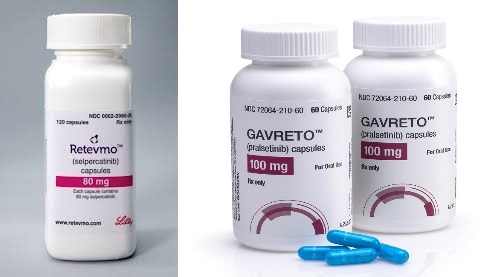Following the recent failures of MET inhibitors to receive insurance benefits, the anticancer-targeted agent makers’ attention focuses on the deliberation results of RET inhibitors.
The Health Insurance Review and Assessment Service (HIRA) currently conducts the review of two RET inhibitors and targeted agents with similar mechanisms – Eli Lilly’s Retevemo (selpercatinib) and Roche’s Gavreto (pralcetinib) – for reimbursement.

Retevmo was tabled on the drug reimbursement evaluation committee last Thursday and became subject to “redeliberation,” going one step ahead of Gavreto, which waits to be tabled on the cancer disease deliberation committee.
Both drugs received approval from the Ministry of Food and Drug Safety at a similar time but showed differences in their indications and progressed toward reimbursement.
Retevmo, which won the regulatory nod on March 11 of last year, has indications to treat adult patients with metastatic RET convergence positive non-small cell lung cancer (NSCLC), adult or adolescent patients 12 and older with progressive or metastatic RET-mutant medullary thyroid cancer requiring systemic therapy, and adult patients with progressive or metastatic RET convergence positive thyroid cancer, not responding to iodine radiation, have the treatment experiences with sorafenib and/lenvatinib, and require systemic therapy.
Gavreto, which won approval on March 29 of the same year, has indications to treat adult patients with RET convergence positive locally progressive or metastatic NSCLC and those with RET-mutant locally progressive or metastatic medullary thyroid cancer requiring systemic therapy.
Retevmo has wider indications than Gavreto regarding patients’ age and cancer types. Both drugs won approval based on response rate and period in the early (phase 1-2) clinical trials. In other words, the level of evidence for clinical efficacy, one of the pillars of the reimbursement review, is insufficient for both drugs.
According to experts, however, there was not much difference between the two drugs in response rate and period for the same indications. Notably, as there are no systemic-therapy treatment options for lung and medullary thyroid cancer except for chemotherapy, they say these drugs are urgently needed.
Although the two received regulatory approvals at a similar time, Retevmo was the first to attempt to enter the reimbursement category. Using the approval-reimbursement interworking system, applied for reimbursement simultaneously with approval but could not set reimbursement standards in the cancer disease deliberation committee in May, failing in its first attempt.
In its second attempt, Retevmo managed to set reimbursement standards at the same committee in November and was tabled on the drug evaluation committee early this month, but the discussion has since been postponed.
On the other hand, Gavreto made its first attempt only around when Retevmo passed the cancer disease deliberation committee.
Considering that Retevmo, with wider indications, has passed the cancer disease deliberation committee, the industry watchers expected Gavreto to pass it if there are no problems with Roche’s drug price and financial sharing plan.
However, the tabling of Gavreto’s application has been delayed longer than expected, and Retevmo’s deliberation is also being postponed, causing speculations on their backgrounds.
Industry executives attributed such foot-dragging to HIRA’s getting the upper hand in negotiations in price and financial sharing as deliberations are underway simultaneously for the two drugs with a similar mechanism.
It is uncertain whether the current situation will work to the advantage of Retevmo and Gavreto in receiving reimbursement.
That’s because two MET inhibitors under similar situations – Novartis’ Tabrecta (capmatinib) and Merck’s Tepmetko (tepotinib) – failed to enter the reimbursement category.
Tabrecta managed to be tabled on the drug evaluation committee in its second attempt last Thursday but failed to get recognition for reimbursement. In February, Tepmetko failed to cross the threshold of the cancer disease deliberation committee in its first attempt.
Tabrecta and Tepmetko also are targeted agents with similar mechanisms, won approval based on the initial clinical trial results of response rate and period, and developed amid the lack of treatment options except for chemotherapies, all of which show similarity to RET inhibitors.
Accordingly, industry watchers pay keen attention to whether Retevmo and Gavreto will cross the threshold of drug evaluation and cancer deliberation committees to enter the reimbursement category, unlike their MET inhibitor competitors.

